
Bagrat Mikoyan, the head of the office of the second President of the Republic of Armenia (RA), Robert Kocharyan, responded to Tuesday’s statements by Prime Minister Nikol Pashinyan. In particular, Mikoyan noted as follows:
I got acquainted with Nikol Pashinyan's thoughts expressed yesterday. Perhaps, realizing where he has made Artsakh [(Nagorno-Karabakh)] and Armenia reach, he is trying to put the blame on others by all possible and impossible means. Although we have repeatedly referred to the falsity of these accusations with facts, we have to repeat once more.
- About being a citizen [of Armenia] for 10 years to run in the presidential election
As of 1998, there was no person in the Republic of Armenia who had at least the last ten years of RA citizenship because until 1991, that is, before the collapse of the USSR, there was one single citizenship of the USSR (…). Moreover, since 1988, Robert Kocharyan was an MP of the Supreme Council of the ASSR.
- About leaving Artsakh out of the negotiation process
- In February 1997, instead of the pair of co-chairs of Russia and Finland, the OSCE Minsk Group [(MG)] triumvirate was formed, which included France, the USA and Russia.
- The first consultations of the troika, without the participation of the conflicting parties, took place on February 24 of the same year in Copenhagen and on March 19 in Paris. They discussed changing the format of the negotiations.
- On April 1-4, 1997, the last round of negotiations took place with the participation of the parties to the conflict, where the mediators announced the transition to "shuttle diplomacy." Basically, the co-chairs abandoned the format of negotiations with the participation of the parties, considering its ineffectiveness. At that last meeting, even during the traditional dinner, it was not possible to bring the parties to a common table.
- At that time, for more than a year and a half, there were direct negotiations between Libaridian and Guluzade, the advisors of the presidents of Armenia and Azerbaijan.
- The first meeting between President Kocharyan and [then-Azerbaijani president Heydar] Aliyev took place on April 1, 1999, at the summit of the CIS countries, at the initiative of [then-Russian President] Boris Yeltsin.
- Thus, the format of negotiations with the participation of the parties to the conflict has been suspended since April 1997, when Robert Kocharyan was the RA Prime Minister for a week and the first meeting between Presidents Kocharyan and Aliyev was to take place two years later.
- One more fact: In the years 1998-2018, during almost all visits to the region, the MG co-chairs went to Artsakh [(Nagorno-Karabakh)] and negotiated with the political leadership of the Artsakh Republic, whereas after 2018—ZERO times.
- The concept of a "common state" was a version developed on the basis of the proposal of the Russian side, which was presented to Azerbaijan before Armenia, and on the day of presentation, November 9, 1998, was sharply rejected by Azerbaijan. Vafa Guluzade stated in the same November 9 interview that these proposals are unacceptable for Azerbaijan, as they threaten Azerbaijan's territorial integrity. [Azerbaijani President] Heydar Aliyev announced on February 21, 2001, in his speech in the Parliament of Azerbaijan, that he would reject the same version at once, explaining that he could not accept it because, I quote: "There is a saying in Azerbaijan: blacker than black. The ‘common state’ proposal was worse than all previous proposals. As soon as I got acquainted with them, I immediately said that I did not want to even discuss them. It was the creation of a second state on the territory of Azerbaijan..." end of quote.
Already on November 10, the co-chairs from Azerbaijan arrived in Armenia and, in fact, they exchanged ideas about the already rejected proposal.
- In the 1999 OSCE Istanbul Document, the NK [(Nagorno-Karabakh)] conflict was the only one in the OSCE region, in which the need to preserve the principle of territorial integrity was not emphasized, and it was a great diplomatic victory [for the Armenian side]. This is a fact, and the accepted document can be familiarized by everyone.
- When talking about the "Meghri [city] exchange", he/Nikol Pashinyan/ quotes the words of his spiritual fathers, teammates and bureaucrats and an article he published in his newspaper in February 2008, calling it an "international press release." What had happened in reality? The person behind the proposal was Aliyev, and it was never discussed with the parties to the conflict in the format of the three presidents. That proposal was rejected by the Armenian side. The details are described on pages 380-381 of the book "Life and Freedom" by Robert Kocharyan.
According to the Key West Document of 2001, Artsakh was to be connected to Armenia with the Lachin corridor. In exchange, a road was given, not a corridor. This document is written in detail and clearly in the book " Life and Freedom," and there is nothing to add to what is written. By the way, that document is also published and anyone can read it.
We have talked about the Madrid document many times. Let's just repeat that it is the first negotiation document by which the right of self-determination of Artsakh was recognized with international guarantees. Opposing that part of that document to the referendum of December 10, 1991 did not even occur to the Azerbaijanis during the entire history of negotiations. The 1991 referendum was held under conditions of war and without observers mandated by authoritative international institutions. The new referendum would reinforce the results of the first, giving it international status.
In the end, historical facts that cannot be manipulated:
During his leadership, President Kocharyan did not cede even one centimeter of land from the Motherland to the enemy, on the contrary.
The period of President Kocharyan's tenure was the most calm and peaceful period in the RA history.
During the tenure of President Kocharyan, the right to self-determination of the people of Artsakh was recognized internationally for the first time, and the Artsakh Republic was developing at a rapid pace.
During the tenure of President Kocharyan, Azerbaijan did not even think that it could attack Armenia and Artsakh, knowing that it would be punished.






















